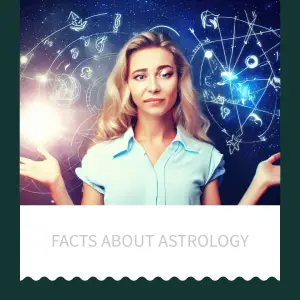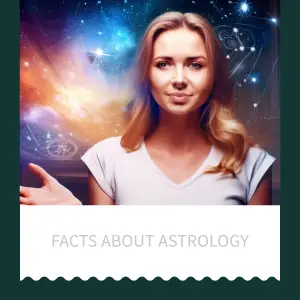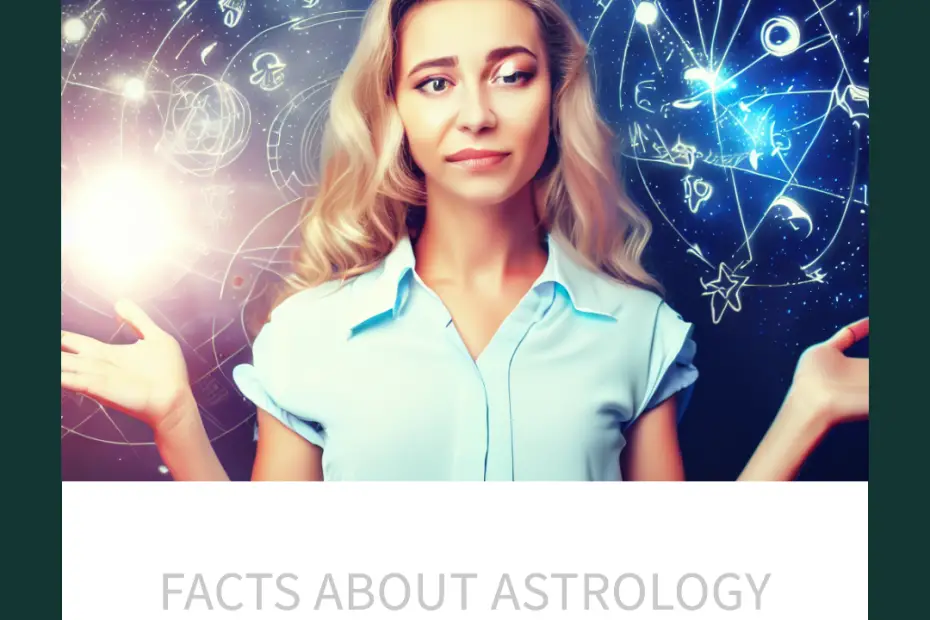
Looking for facts about astrology to finally settle that cosmic debate at your dinner table?
Whether you’re a seasoned stargazer or just someone who’s wondering if Mercury’s retrograde is to blame for your latest technology mishap, buckle up for a celestial joyride through zodiac curiosities.
From starry origins to personality quirks, we’re dishing out the cosmic scoop!
Ready to uncover why your friend’s Virgo energy might explain their closet organization obsession? Keep reading!
Discover Your FREE Personalized Moon Reading Now
Definition and Overview
At its core, astrology is an intricate system that endeavors to unveil a connection between celestial movements and human affairs.
This alluring endeavor suggests that the positions and alignments of celestial bodies,
such as planets and stars, can influence and offer insights into various aspects of our lives.
Historical Development

Tracing its origins back to ancient civilizations, astrology has etched its mark in cultures across the globe.
Mesopotamians navigated by the stars, while the Egyptians linked constellations to their pantheon of gods.
The Greeks, too, delved into astrological wisdom, and it thrived in the Islamic Golden Age.
Through the annals of time, astrology has entwined itself with our understanding of existence.
Basics of Astrology
A. Zodiac Signs and Their Characteristics
The zodiac, a celestial band, is divided into twelve signs, each with distinct attributes. Aries heralds beginnings, while Taurus embodies stability.
Discover Your FREE Personalized Moon Reading NowGemini’s duality mirrors its symbol, the twins, and Cancer embraces nurturing energies. The majestic Leo exudes leadership, followed by Virgo’s analytical prowess.
Libra seeks harmony, while Scorpio delves into the depths of transformation. Sagittarius
embodies adventure, Capricorn scales ambitious heights, Aquarius is visionary, and Pisces is boundless in its empathy.
B. The Concept of Horoscopes
Horoscopes, cosmic messages encapsulated in your zodiac sign, have become a beloved part of modern astrology.
These snippets offer brief glimpses into your day, tailored to your sign’s traits and planetary positions. It’s like a cosmic weather report guiding you through life’s journey.
Discover Your FREE Personalized Moon Reading NowC. Birth Charts and Their Components
Your birth chart, a celestial snapshot at the moment of your birth, reveals an intricate web of planetary positions.
The sun sign, a cornerstone of your personality, is just the beginning. Moon, rising, and
other planetary influences combine to shape your cosmic fingerprint, painting a nuanced portrait of your being.
Types of Astrology
A. Western Astrology
- Zodiac System and Its Twelve Signs
The Western zodiac weaves a narrative through twelve signs, each aligning with a specific time of year.
These signs, infused with distinct qualities, intertwine with planets, offering a tapestry of insights.
Discover Your FREE Personalized Moon Reading Now- Planetary Influences and Meanings
Planets play a pivotal role in Western astrology. Mercury governs communication, Venus embodies love, and Mars fuels action.
Jupiter signifies expansion, while Saturn brings life lessons. Uranus, Neptune, and Pluto usher in transformational energies, weaving a celestial symphony.
B. Vedic Astrology (Jyotish)
- Unique Features and Differences from Western Astrology
Vedic astrology, or Jyotish, hails from ancient India, boasting its own set of principles and calculations.
It places emphasis on lunar positions and has a distinct approach to planetary periods and remedies.
- Importance in Indian Culture
Jyotish is deeply woven into the cultural fabric of India. It guides major life events, from
Discover Your FREE Personalized Moon Reading Nowweddings to business ventures, with meticulous precision, resonating with the belief in cosmic interconnectedness.
C. Chinese Astrology
- Animal Zodiac and Its Twelve Signs
Chinese astrology revolves around a twelve-year cycle, each year represented by an animal.
These creatures, imbued with symbolic significance, bestow distinct traits on individuals born under their reign.
- Five Elements Theory
The five elements – wood, fire, earth, metal, and water – intersect with the animal
zodiac, creating a complex interplay that adds depth and specificity to Chinese astrological interpretations.
Discover Your FREE Personalized Moon Reading NowAstrological Beliefs and Practices
A. Personality Traits and Compatibility
- Sun Signs and Character Traits
Sun signs, the cosmic cornerstones of astrology, unveil character traits. Aries is bold, Cancer is nurturing, and Capricorn is determined.
These archetypes offer insights into our inherent nature.
- Love Compatibility and Relationships
Astrology delves into love’s cosmic dance, examining compatibility between signs. While not a steadfast rule, these insights can offer guidance in matters of the heart.
B. Predictive Astrology
- Forecasting Events and Life Trends
Predictive astrology peers into the future’s mist, offering glimpses of potential life events.
Transits and progressions, as planets move through the heavens, paint a canvas of forthcoming experiences.
Discover Your FREE Personalized Moon Reading Now- Role of Transits and Progressions
Transits, planetary movements impacting natal planets, and progressions, symbolizing inner growth, shape the tapestry of predictive astrology, providing a cosmic roadmap.
C. Medical Astrology
- Zodiac Signs and Health Indicators
Medical astrology suggests a link between celestial positions and physical well-being.
Zodiac signs correspond with specific body parts, offering insights into potential health tendencies.
- Traditional Beliefs and Modern Interpretations
While traditional beliefs intertwine with medical astrology, modern interpretations view it through a holistic lens, aligning celestial energies with overall wellness.
Criticisms and Controversies
A. Lack of Empirical Evidence
Astrology often faces scrutiny due to its lack of empirical evidence. Skeptics argue that its interpretations lack scientific validation.
Discover Your FREE Personalized Moon Reading NowB. Barnum Effect and Subjective Validation
The Barnum effect, a psychological phenomenon, can make vague astrological
descriptions feel highly personal, showcasing the human tendency to seek meaning in ambiguous statements.
C. Ethical Concerns and Misuses
Astrology’s allure has occasionally led to misuse, with some exploiting vulnerable individuals.
Ethical concerns arise when astrological insights are wielded for personal gain.
Modern Perspectives
A. Psychological Astrology
- Carl Jung’s Influence and Archetypes
Psychological astrology, influenced by Carl Jung, explores the depths of the psyche.
Discover Your FREE Personalized Moon Reading NowArchetypes, universal symbols, connect with astrological symbols, offering profound self-discovery.
- Self-Discovery and Personal Growth
Psychological astrology acts as a mirror, reflecting inner landscapes. It aids in self-discovery, fostering personal growth through a cosmic lens.
B. Entertainment and Pop Culture
- Horoscopes in Newspapers and Online
Horoscopes have transcended ancient scrolls, finding a home in newspapers and online platforms. These succinct snippets offer a daily dose of cosmic contemplation.
- Astrology in Literature, Films, and Media
Astrology’s enchantment permeates literature, films, and media. From character traits to plot twists, its celestial allure adds depth to the storytelling.
Related Article: The Ultimate Guide to Choosing the Best Monocular for Stargazing —
Discover Your FREE Personalized Moon Reading NowScientific Viewpoints
A. Astronomy vs. Astrology
Astronomy, the scientific study of celestial bodies, stands distinct from astrology. While astronomy seeks empirical truths, astrology delves into cosmic interpretations.
B. Debunking Astrological Claims
Skeptics often debunk astrological claims, citing a lack of statistical correlation between celestial positions and human affairs.
C. Cognitive Biases and Human Tendency to Seek Patterns
Astrology’s enduring appeal could stem from cognitive biases, like the human inclination to find patterns and meaning even in randomness.
Related Article: Perfection Years Astrology: Your Guide to Personal Transformation —
FAQs About facts about astrology
What are some fun facts about astrology?
Astrology has been practiced for thousands of years across different cultures. It’s intriguing how celestial bodies are believed to influence human behavior and events.
Discover Your FREE Personalized Moon Reading NowWhat are the 3 things in astrology?
Astrology comprises three key elements: planets, signs, and houses. These interact to create personalized insights into an individual’s life and characteristics.
What are the main points of astrology?
Astrology studies the positions and movements of celestial bodies to interpret their
impact on human affairs and natural phenomena, providing insights into personality traits, relationships, and events.
Who invented astrology?
The origins of astrology can be traced back to ancient civilizations like the Babylonians, Egyptians, and Greeks. It developed independently across cultures over time.
Is there any logic behind astrology?
Astrology’s logic is rooted in symbolic connections between celestial patterns and earthly events. It blends astronomical observations with interpretative frameworks.
Discover Your FREE Personalized Moon Reading NowWhat is ♓?
♓ represents the Pisces zodiac sign, often associated with intuition, compassion, and artistic inclinations.
Which horoscope is unique?
Each horoscope offers unique insights, but Aquarius is often considered one of the most distinctive due to its innovative and unconventional traits.
Why was astrology created?
Astrology emerged as an attempt to understand and predict natural phenomena, human behavior, and societal trends by observing celestial patterns.
Why are zodiac signs interesting?
Zodiac signs capture people’s attention due to their relatable descriptions, potential insights, and the human desire to explore one’s identity and future.
Why is it called astrology?
The term “astrology” originates from the Greek words “Astron” (star) and “logia” (study of). It reflects the practice’s focus on celestial bodies’ influence on life.
Discover Your FREE Personalized Moon Reading NowWhat does astrology talk about?
Astrology delves into various aspects of life, including personality traits, relationships, career paths, and major life events, providing a holistic perspective.
Final Thoughts About facts about astrology
Astrology, a belief system rooted in celestial patterns influencing human lives, has intrigued civilizations for centuries.
Despite lacking empirical evidence, it endures as a cultural and personal phenomenon.
Its allure lies in its potential for introspection and guidance, though skeptics question its scientific legitimacy.
Recognizing its non-scientific nature can foster a balanced approach, appreciating its role in cultural history and its capacity to offer insight into individual perspectives.
Discover Your FREE Personalized Moon Reading NowWhile facts about astrology may remain contested, its impact on societies and
an individual is an undeniable testament to the intricate relationship between cosmic observations and human interpretation.
